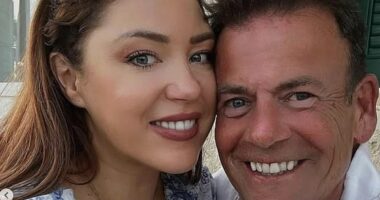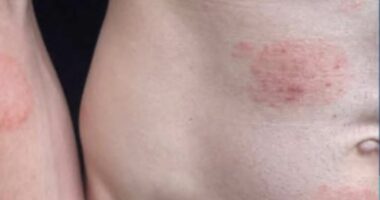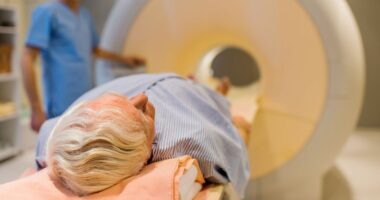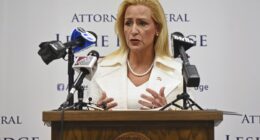Share this @internewscast.com
When Pidgeon Pagonis was born in a Chicago hospital 37 years ago, her doctors saw something that alarmed them. “I was born looking female on the outside,” Pagonis said, “and then it was discovered that on the inside of my body, I had not completely the parts that would be considered female.”
Pidgeon (whose birth name is Jennifer) looked like a little girl. But instead of ovaries, there were internal testes, and instead of XX chromosomes, Pidgeon had the male XY combination. Pidgeon Pagonis was born intersex.
And she’s not alone. According to statistics cited by the United Nations, 0.05 to 1.7 percent of the world’s population is intersex. “That’s roughly the amount of people in the state of Minnesota combined, or the country of Japan,” Pagonis said.
CBS News
Intersex is defined by the Oxford English Dictionary as a person “having external or internal sexual organs that are not clearly male or female.” But Pagonis said no one ever used the term to her parents. Instead, doctors followed what has long been the medical practice in this country: to make Pidgeon look more physically female.
And that meant surgeries. At thirteen months old, the testes were removed, although that’s not, Pidgeon said, quite how doctors described it to her parents. “They said, ‘Oh, your daughter, she has these things called gonads, which are kind of like underdeveloped ovaries. And so these underdeveloped ovaries will turn cancerous if we leave them in, and so, let’s just take time out so that cancer can never happen later in life.'”
There were more surgeries at age four, and again, at age 12, when the pre-teen was asked to consent to a procedure known as a vaginoplasty. The surgery (which Pidgeon said was cosmetic) left scar tissue and pain. “My parents were believing what these doctors said, which was, ‘We’re going to give your kid the best life possible. Everything’s going to be great.’ And it wasn’t the truth.”
There have always been people with intersex traits, but until recently the term used to describe them was “hermaphrodite” (taken from a winged creature in Greek mythology).
Elizabeth Reis, a professor at the City University of New York, has written “Bodies in Doubt,” a book about the history of intersex in America. She says those with ambiguous sex characteristics were seen as freakish and often feared. “In early America, they really thought of hermaphrodites as monstrous, and that it must have been something that Satan had a hand in,” she said.
Johns Hopkins University Press
As medical science advanced, Reis said, and anesthesia became available, doctors began to use surgery to “fix” what they saw as a disorder: “They thought that if people were unsure of their own sex, then they might have romantic inclinations towards the ‘wrong’ sex. And they really wanted to avoid homosexuality.”
Doctors believed surgery was best done early before a patient knew he or she was intersex, based on research conducted in the 1950s by psychologist John Money at Johns Hopkins University. Reis said, “John Money said the best time to deal with this is in infancy. The gender has not emerged yet. So, babies are malleable. You could change their genitals, you could later give them hormones, you could basically raise them in the gender you thought was most appropriate. And everything would be fine.”
But it didn’t always turn out fine, said Reis: “I know people who found out much later what happened in their family. The secrecy can be devastating in that way, to find out something about yourself that the doctors told your parents, ‘Don’t tell.'”
That secrecy is a central theme in Pidgeon’s memoir, “Nobody Needs to Know.”
Read Related Also: ‘Alarming’ rates of babies with antibiotic-resistant bugs in Asia-Pacific, Australian study finds
At age 18, while in college, Pidgeon finally saw her medical records: “I saw the words ‘male’ first. That’s what stuck out to me. ‘Male pseudohermaphrodite, 46 XY.’ I remember looking in the mirror … I pulled my hair back. And I was, like, studying my face. I was just like, ‘Am I a boy? Was I born a boy and they they somehow made me a girl for some reason?’ And I was just so confused. I don’t know how to explain that feeling. It’s like, say you had a compass and you were in the forest. Now that compass is broken and it’s dark and you don’t know what’s going on anymore and you are completely lost.”
Topple Books & Little A
It was also tough for Pidgeon’s parents, who had consented to surgeries over the years that doctors told them were needed for their child to have a normal life. “It’s really hard for them,” said Pidgeon. “They have to live with thinking they did the right thing, but living with the fact that I’ve grown up to feel that it wasn’t the right thing. But I don’t blame them.”
As a surgical resident in 2008, urologist Dr. Ilene Wong once performed the same type of surgery Pagonis had as an infant. She said, “Intersex conditions have been, for a long time, medicalized and made into a disorder by the medical community.”
Wong now believes the medical community has failed intersex patients: “The main thing that’s so horrific about the surgeries that were performed on intersex children for cosmetic purposes is just that their outcomes are incredibly poor – complication rates probably greater than 50%, resulting in scarring, resulting in chronic pain.”
Pidgeon now wonders what life would have been like without the surgeries. Because the testes that provide hormones were removed, Pidgeon was diagnosed with osteoporosis in her mid-20s. “All that they do when they ‘fix you’ and ‘make you normal’ is set you up for an abnormal experience of this life,” Pidgeon said.
Moriarty asked, “Don’t you think these doctors also thought your life might be easier if you fit that image of being female?”
“Yes. Sure. They probably do,” Pidgeon replied. “But I would love to have a doctor sit here with me today and I would say, ‘If I cut off your penis to make you into what I think is a normal girl because I think your life would be easier, how would you feel about that, sir?'”
CBS News
Pidgeon has become an activist in the intersex community, determined to end unnecessary surgeries on intersex infants. In 2020, the hospital that performed Pidgeon’s surgeries, Lurie Children’s in Chicago, issued a statement that said, in part, “This approach was harmful and wrong … and we apologize and are truly sorry.”
Pidgeon Pagonis is hoping that the word once rarely said aloud will now become part of the conversation: “There’s a lot of intersex people who identify as a woman or as a man. But me? I’m happy identifying as intersex, and same for my gender. My gender is non-binary.”
READ AN EXCERPT: “Nobody Needs to Know” by Pidgeon Pagonis
For more info:
- “Nobody Needs to Know: A Memoir” by Pidgeon Pagonis (Topple Books & Little A), in Hardcover, Trade Paperback, eBook and Audio formats, available via Amazon, Barnes & Noble and Bookshop.org
- Intersex activist Pidgeon Pagonis
- “Bodies in Doubt: An American History of Intersex” (2nd edition) by Elizabeth Reis (Johns Hopkins University Press), in Trade Paperback and eBook formats, available via Amazon, Barnes & Noble and Bookshop.org
- Elizabeth Reis, professor, City University of New York
- Urologist Dr. Ilene Wong (I.W. Gregorio)
Story produced by Kay Lim. Editor: George Pozderec.
















